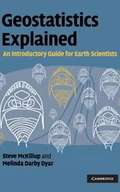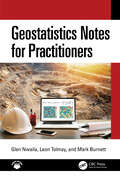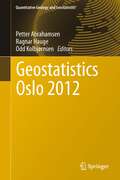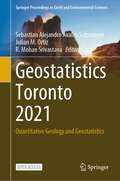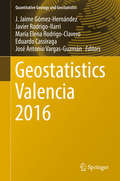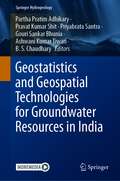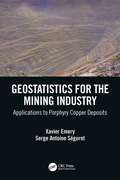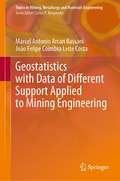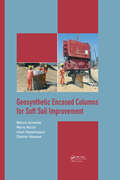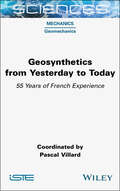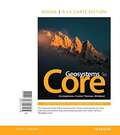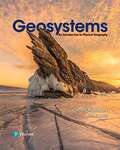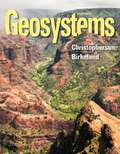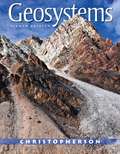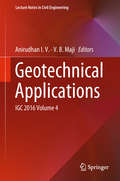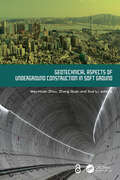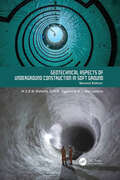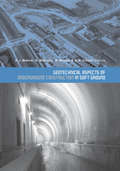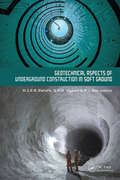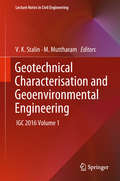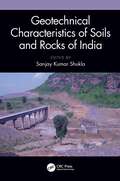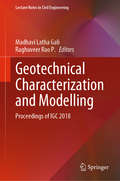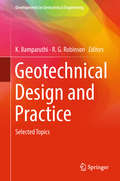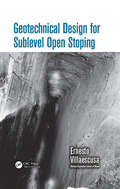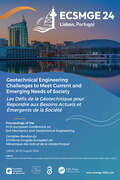- Table View
- List View
Geostatistics Explained
by Steve Mckillup Melinda Darby DyarA reader-friendly introduction to geostatistics for students and researchers struggling with statistics. Using simple, clear explanations for introductory and advanced material, it demystifies complex concepts and makes formulas and statistical tests easy to apply. Beginning with a critical evaluation of experimental and sampling design, the book moves on to explain essential concepts of probability, statistical significance and type 1 and type 2 error. An accessible graphical explanation of analysis of variance (ANOVA) leads onto advanced ANOVA designs, correlation and regression, and non-parametric tests including chi-square. Finally, it introduces the essentials of multivariate techniques, multi-dimensional scaling and cluster analysis, analysis of sequences and concepts of spatial analysis. Illustrated with wide-ranging examples from topics across the Earth and environmental sciences, Geostatistics Explained can be used for undergraduate courses or for self-study and reference. Worked examples at the end of each chapter reinforce a clear understanding of the statistical tests and their applications.
Geostatistics Notes for Practitioners
by Mark Burnett Glen Nwaila Leon TolmayThis book provides a practical perspective of all the processes involved in estimating mineral resources and reserves, including mine-to-mill reconciliation. It provides an integrated step-by-step explanation of processes for performing each step, including insight from academic and industry practitioners. Each chapter details a specific aspect of the estimation processes in a practical manner. It contains examples and case studies to illustrate the practical application of geostatistics in mineral resource estimation, mineral reserve conversion, and reconciliation. Features Provides a step-by-step guide with over 10,000 lines of Python code for hands-on demonstration, from start to finish, for both linear and non-linear geostatistical methods. Explains practical geostatistics processes and functionality. Simplifies explanation of mathematical /statistical concepts and application. Discusses generalised examples to aid the process steps. Reviews processes involved in the mineral resources’ estimation and ore reserve conversion. This book is intended for third-year and postgraduate students in Mineral Resources Management, Geology, Spatial Statistics, and Mining Engineering, as well as practising professionals.
Geostatistics Oslo 2012
by Odd Kolbjørnsen Petter Abrahamsen Ragnar HaugeThis book consists of 44 technical papers presented at the Ninth International Geostatistics Congress held in Oslo, Norway in June 2012. The papers have been reviewed by a panel of specialists in Geostatistics. The book is divided into four main sections: Theory; Petroleum; Mining; and Environment, Climate and Hydrology. The first section focuses on new ideas of general interest to many fields of applications. The next sections are more focused on the particular needs of the particular industry or activity. Geostatistics is vital to any industry dependent on natural resources. Methods from geostatistics are used for estimating reserves, quantifying economical risk and planning of future industrial operations. Geostatistics is also an important tool for mapping environmental hazard and integrating climate data.
Geostatistics Toronto 2021: Quantitative Geology and Geostatistics (Springer Proceedings in Earth and Environmental Sciences)
by Sebastian Alejandro Avalos Sotomayor Julian M. Ortiz R. Mohan SrivastavaThis open access book provides state-of-the-art theory and application in geostatistics. Geostatistics Toronto 2021 includes 28 short abstracts, 18 extended abstracts, and 7 full articles in the fields of geostatistical theory, multi-point statistics, earth sciences, mining, optimal drilling, domains, seismic, classification uncertainty risk, and artificial intelligence and machine learning. All contributions were presented at the 11th International Geostatistics Congress held in virtually at Toronto, Canada, from July 12-16, 2021. This book is valuable to researchers, scientists, and practitioners in geology, mining, petroleum, geometallurgy, mathematics, and statistics.
Geostatistics Valencia 2016
by J. Jaime Gómez-Hernández Javier Rodrigo-Ilarri María Elena Rodrigo-Clavero Eduardo Cassiraga José Antonio Vargas-GuzmánThis book contains selected contributions presented at the 10th International Geostatistics Congress held in Valencia from 5 to 9 September, 2016. This is a quadrennial congress that serves as the meeting point for any engineer, professional, practitioner or scientist working in geostatistics. The book contains carefully reviewed papers on geostatistical theory and applications in fields such as mining engineering, petroleum engineering, environmental science, hydrology, ecology, and other fields.
Geostatistics and Geospatial Technologies for Groundwater Resources in India (Springer Hydrogeology)
by Gouri Sankar Bhunia Pravat Kumar Shit Ashwani Kumar Tiwari Partha Pratim Adhikary Priyabrata Santra B. S. ChaudharyThis book offers essential information on geospatial technologies for water resource management and highlights the latest GIS and geostatistics techniques as they relate to groundwater.Groundwater is inarguably India's single most important natural resource. It is the foundation of millions of Indian farmers' livelihood security and the primary source of drinking water for a vast majority of Indians in rural and urban areas. The prospects of continued high rates of growth in the Indian economy will, to a great extent, depend on how judiciously we can manage groundwater in the years to come.Over the past three decades, India has emerged as by far the single largest consumer of groundwater in the world. Though groundwater has made the country self-sufficient in terms of food, we face a crisis of dwindling water tables and declining water quality. Deep drilling by tube wells, which was once part of the solution to water shortages, is now in danger of becoming part of the problem. Consequently, we urgently need to focus our efforts on the sustainable and equitable management of groundwater. Addressing that need, this book presents novel advances in and applications of RS–GIS and geostatistical techniques to the research community in a precise and straightforward manner.
Geostatistics for the Mining Industry: Applications to Porphyry Copper Deposits
by Xavier Emery Serge Antoine SéguretThis book covers the main mining issues where geostatistics, a discipline founded in the 1960s to study regionalized variables measured at a limited number of points in space, is expected to play a role. Each chapter of the book is associated with a stage of the mining sequence, including the interpretation and geological modeling of mineral deposits, evaluation of in-situ and recoverable resources, long-term mine planning, short-term planning and ore control, geotechnics, geometallurgy and sampling. This work, featuring more than 150 illustrations, avoids the traditional laborious and crippling theoretical treatment of geostatistics and is systematically oriented toward a practical exhibition of the problems and proposed solutions. The writing is fluid and intended to involve the reader. The book is the fruit of more than 35 cumulative years of applied research by the authors, a professor at the University of Chile and a researcher at Mines ParisTech, carried out in collaboration with the Chilean company Codelco since the late 1990s. Despite focusing on copper porphyry deposits, the generalization of the methods presented to the entire mining industry is straightforward. The broad range of problems addressed, including generally neglected disciplines such as geotechnics, geometallurgy and sampling, and their practical presentation make this book unique and usable by a very wide audience – students, researchers, geologists, engineers, geotechnicians and metallurgists.
Geostatistics with Data of Different Support Applied to Mining Engineering (Topics in Mining, Metallurgy and Materials Engineering)
by Marcel Antonio Arcari Bassani João Felipe Coimbra Leite CostaThis book explains the integration of data of different support in Geostatistics. There is a common misconception in the mining industry that the data used for estimation/simulation should have the same size or support. However, Geostatistics provides the tools to integrate several types of information that may have different support. This book aims to explain these geostatistical tools and provides several examples of applications. The book is directed for a broad audience, including engineers, geologists, and students in the area of Geostatistics.
Geosynthetic Encased Columns for Soft Soil Improvement
by Márcio Almeida Mario Riccio Iman Hosseinpour Dimiter AlexiewThe geosynthetic encased column (GEC) is a relatively recent method developed for soft soil improvement. The method was firstly introduced as a concept in the 1980s and first practical applications started in the 1990s. GECs have been widely used in some parts of the world for the last three decades. However, there is no book in the literature summarizing the knowledge accumulated during this period in relation to this soft ground improvement technique. <P><P>The purpose of this book is to provide readers with the GEC fundamentals and practical applications. Chapter 1 presents the general principles of this ground improvement technique including the methods used for GEC installation and how the material properties may be selected. Chapter 2 presents the design methods, thus settlement calculations by means of analytical methods and stability calculations by limit equilibrium methods are explained in detail. Chapter 3 presents calculation examples illustrating the usual steps to be done for both service limit state and ultimate limit state designs. Then field performances exemplifying practical applications of the GEC technique are presented in Chapter 4 for some case histories. Following numerical analyses, often used in design to complement analytical methods, are presented in Chapter 5. Annexes I and II at the end contain the charts developed to perform settlement calculations. <P><P>The book combines the experiences of four authors with different academic and industry backgrounds to describe GEC design and performance. It is aimed at civil engineers in general, particularly geotechnical engineers, either working in design or in practice, at graduate students, and at senior undergraduate students.
Geosynthetics from Yesterday to Today: 55 Years of French Experience (ISTE Invoiced)
by Pascal VillardThe history of geosynthetics began over fifty years ago worldwide. It is still in the process of being written by engineers, researchers and enthusiasts, who see these products as a concrete response to the environmental challenges facing our society. Geosynthetics from Yesterday to Today presents the basic concepts and notions required for the use, application, dimensioning and durability of these products, which have constantly improved over time to meet ever-changing technical and environmental challenges. Based on experience acquired in France over several decades, this book establishes the soundness of these techniques and explains their concept and evolution. It is aimed at both beginners and experienced engineers, who are keen to learn more about this fascinating subject.
Geosystems Core
by Robert Christopherson Ginger Birkeland Charles Thomsen Stephen CunhaFor introductory physical geography courses. <p><p>A brief, visual, and media-rich approach to physical geography <p><p>Highly regarded, best-selling author Robert Christopherson has partnered with renowned geographer and educator Stephen Cunha and longtime media author Charlie Thomsen to establish Geosystems Core, a brief, modular, highly visual and flexible textbook and springboard into physical geography. This approach allows instructors to teach concepts in their preferred order, empowering them to bring in their own case studies and applications to further illustrate the core concepts. Instructors can also easily augment and extend the First Edition of the print book by leveraging the rich library of media and customizable assessment resources in MasteringGeography.
Geosystems: An Introduction To Physical Geography
by Robert Christopherson Ginger BirkelandGeosystems fully defines geography by offering the latest science in an easily understood matter. With its breathtaking remote sensing imagery, excellent cartography, and technological tie-ins, this book is an interesting and well-conceived introduction to the study of Physical Geography. Using the latest in satellite imagery and current statistical information, this book covers such topics as: the energy-atmosphere system; the water, weather, and climate systems; the earth-atmosphere interface; and soils, ecosystems, and biomes.
Geosystems: An Introduction To Physical Geography 9th Edition
by Robert W. ChristophersonFor Introductory Physical Geography Courses Among the most highly regarded in physical geography, Robert Christopherson's best-selling texts are known for their meticulous attention to detail, currency, accuracy, and rich integration of climate change science. Geosystems: An Introduction to Physical Geography, Ninth Edition is uniquely organized to present Earth systems topics as they naturally occur: atmosphere, hydrosphere, lithosphere and biosphere.
Geosystems: An Introduction to Physical Geography (8th Edition)
by Robert W. ChristophersonAmong the most highly regarded in physical geography, Robert Christopherson's bestselling texts are known for meticulous attention to detail, currency, accuracy, rich integration of climate change science, and strong multimedia program. Geosystems: An Introduction to Physical Geography,Eighth Edition is organized around the natural flow of energy, materials, and information, presenting subjects in the same sequence in which they occur in nature--an organic, holistic approach that is unique in this discipline. Each chapter also includes strong learning tools and a structured learning path, with Key Learning Concepts presented at the start of the chapter, Key Learning Concepts Review at the end of the chapter, and Critical Thinking questions integrated throughout. Offering current examples and modern science within a one-of-a-kind Earth systems organization, Christopherson combines student-friendly writing, outstanding art, and a strong multimedia program for a truly unique physical geography experience.
Geotechnical Applications: IGC 2016 Volume 4 (Lecture Notes in Civil Engineering #13)
by Anirudhan I. V. V. B. MajiThis book comprises select proceedings of the annual conference of the Indian Geotechnical Society. The conference brings together research and case histories on various aspects of geotechnical engineering and geoenvironmental engineering. The book presents papers on geotechnical applications and case histories, covering topics such as (i) shallow and deep foundations; (ii) stability of earth and earth retaining structures; (iii) rock engineering, tunneling, and underground constructions; (iv) forensic investigations and case histories; (v) reliability in geotechnical engineering; and (vi) special topics such as offshore geotechnics, remote sensing and GIS, geotechnical education, codes, and standards. The contents of this book will be of interest to researchers and practicing engineers alike.
Geotechnical Aspects of Underground Construction in Soft Ground
by Wan-Huan ZhouGEOTECHNICAL ASPECTS OF UNDERGROUND CONSTRUCTION IN SOFT GROUND comprises a collection of 68 contributions, including 55 technical papers, 6 General Reports, 5 Keynotes, 1 Fujita Lecture, and 1 Bright Spark Lecture presented at the 11th International Symposium on Geotechnical Aspects of Underground Construction in Soft Ground (IS-Macau 2024), held in Macao SAR, China, on June 14-17, 2024.The symposium is the latest in a series that began in New Delhi in 1994 and was followed by symposia in London (1996), Tokyo (1999), Toulouse (2002), Amsterdam (2005), Shanghai (2008), Rome (2011), Seoul (2014), Sao Paulo (2017), and Cambridge (2022). This symposium was organized by the University of Macau, Civil Engineering Laboratory of Macau, and the Macau Association for Geotechnical Engineering under the auspices of TC204 of ISSMGE. The book includes contributions from more than 15 countries on the research, design, and construction of underground works in soft ground. The theme of IS-Macau 2024 is “Tunnelling and Underground Construction for Smart Cities”. The contributions cover the following topics: Basic properties and soil improvement in soft ground Constitutive and Numerical Modelling Innovative analysis and design in tunneling and underground construction Smart monitoring and visualization technologies for tunneling and underground construction Sustainability and resilience of underground infrastructure Field case studies Similar to previous editions, GEOTECHNICAL ASPECTS OF UNDERGROUND CONSTRUCTION IN SOFT GROUND serves as an invaluable resource offering insights into the contemporary methods of analyzing, designing, and executing tunnels and deep excavations within soft ground environments, crucial for the advancement of smart cities. The book is particularly aimed at academics and professionals interested in geotechnical and underground engineering.
Geotechnical Aspects of Underground Construction in Soft Ground. 2nd Edition: Proceedings of the Tenth International Symposium on Geotechnical Aspects of Underground Construction in Soft Ground, IS-Cambridge 2022, Cambridge, United Kingdom, 27-29 June 2022
by Mohammed Z.E.B. ElshafieGEOTECHNICAL ASPECTS OF UNDERGROUND CONSTRUCTION IN SOFT GROUND comprises a collection of 112 contributions presented at the Tenth International Symposium on Geotechnical Aspects of Underground Construction in Soft Ground, held in Cambridge, United Kingdom, 27-29th June 2022. This 2nd edition also includes four general reports on the symposium themes which give an overview of the papers submitted to the symposium, covered in four technical sessions. The symposium is the latest in a series which began in New Delhi in 1994, and was followed by symposia in London (1996), Tokyo (1999), Toulouse (2002), Amsterdam (2005), Shanghai (2008), Rome (2011), Seoul (2014) and Sao Paulo (2017). This symposium was organised by the Geotechnical Research Group at the University of Cambridge, under the auspices of the Technical Committee TC204 of the International Society for Soil Mechanics and Geotechnical Engineering (ISSMGE). Geotechnical Aspects of Underground Construction in Soft Ground includes contributions from more than 25 countries on the research, design and construction of underground works in soft ground. The contributions cover the following themes: Field case studies Sensing technologies and monitoring for underground construction in soft ground Physical and numerical modelling of tunnels and deep excavations in soft ground Seismic response of underground infrastructure in soft ground Design and application of ground improvement for underground construction Ground movements, interaction with existing structures and mitigation measures Similar to previous editions, GEOTECHNICAL ASPECTS OF UNDERGROUND CONSTRUCTION IN SOFT GROUND represents a valuable source of reference on the current practice of analysis, design, and construction of tunnels and deep excavations in soft ground. The book is particularly aimed at academics and professionals interested in geotechnical and underground engineering.
Geotechnical Aspects of Underground Construction in Soft Ground: Proceedings of the 5th International Symposium TC28. Amsterdam, the Netherlands, 15-17 June 2005
by K. J. Bakker A. Bezuijen W. Broere E. A. KwastA valuable source of reference on the current practices of analysis, design and construction of tunnels and underground structures in soft ground. This collection of reviewed papers covers a wide range of tunnelling practice, from deep excavations in Singapore to the construction of a new metro line in Barcelona.
Geotechnical Aspects of Underground Construction in Soft Ground: Proceedings of the Tenth International Symposium on Geotechnical Aspects of Underground Construction in Soft Ground, IS-Cambridge 2022, Cambridge, United Kingdom, 27-29 June 2022
by Mohammed Z.E.B. ElshafieGeotechnical Aspects of Underground Construction in Soft Ground comprises a collection of 112 papers, four general reports on the symposium themes, the Fujita Lecture, three Special Lectures and the Bright Spark Lecture presented at the Tenth International Symposium on Geotechnical Aspects of Underground Construction in Soft Ground, held in Cambridge, United Kingdom, 27-29 June 2022.The symposium is the latest in a series which began in New Delhi in 1994, and was followed by symposia in London (1996), Tokyo (1999), Toulouse (2002), Amsterdam (2005), Shanghai (2008), Rome (2011), Seoul (2014) and Sao Paulo (2017). This was organised by the Geotechnical Research Group at the University of Cambridge, under the auspices of the Technical Committee TC204 of the International Society for Soil Mechanics and Geotechnical Engineering (ISSMGE).Geotechnical Aspects of Underground Construction in Soft Ground includes contributions from more than 25 countries on research, design and construction of underground works in soft ground. The contributions cover: Field case studies Sensing technologies and monitoring for underground construction in soft ground Physical and numerical modelling of tunnels and deep excavations in soft ground Seismic response of underground infrastructure in soft ground Design and application of ground improvement for underground construction Ground movements, interaction with existing structures and mitigation measures The general reports give an overview of the papers submitted to the symposium, covered in four technical sessions. The proceedings include the written version of the five invited lectures covering topics ranging from developments in geotechnical aspects of underground construction, tunnelling and groundwater interaction (short and long-term effects), the influence of earth pressure balance shield tunnelling on pre-convergence and segmental liner loading (field observations, modelling and implications on design).Similar to previous editions, Geotechnical Aspects of Underground Construction in Soft Ground represents a valuable source of reference on the current practice of analysis, design, and construction of tunnels and deep excavations in soft ground. The book is particularly aimed at academics and professionals interested in geotechnical and underground engineering.
Geotechnical Characterisation and Geoenvironmental Engineering: IGC 2016 Volume 1 (Lecture Notes in Civil Engineering #16)
by V. K. Stalin M. MuttharamThe book comprises selected proceedings of the 2016 annual conference of the Indian Geotechnical Society. The technical papers presented on the theme “Geotechnical Characterisation and Geoenvironmental Engineering” highlight the modified geotechnical properties of soil admixed industrial waste and also the characteristics of soil with different pore fluid under varying test conditions. The major topics covered are (i) characterisation of soils, rocks and synthesised materials and (ii) geoenvironmental engineering and behaviour of unsaturated soil. This book will prove a valuable reference for researchers and practicing engineers alike.
Geotechnical Characteristics of Soils and Rocks of India
by Sanjay Kumar ShuklaThis book presents mainly the geotechnical details of geomaterials (soils and rocks) found in all the 36 states and union territories of India. There are 37 chapters in this book. Chapter 1 provides an overview of geomaterials, focusing on their engineering properties as determined based on the project site investigations and laboratory/field tests; this will help readers understand the technical details explained throughout the book, with each chapter dealing with geomaterials of one state/union territory only. Each chapter, contributed by a team of authors, follows a common template with the following sections: introduction, major types of soils and rocks, properties of soils and rocks, use of soils and rocks as construction materials, foundation and other geotechnical structures, other geomaterials, natural hazards, case studies and field tests, geoenvironmental impact on soils and rocks, concluding remarks and references. All the chapters cover highly practical information and technical data for application in ground infrastructure projects, including foundations of structures (buildings, towers, tanks, machines and so on), highway, railway and airport pavements, embankments, retaining structures/walls, dams, reservoirs, canals and ponds, and landfills and tunnels. These details are also highly useful for professionals dealing with mining, oil and gas projects and agricultural and aquacultural engineering projects. Although this book covers the Indian ground characteristics, the information provided can be helpful in some suitable forms to the professionals of other countries having similar ground conditions and applications.
Geotechnical Characterization and Modelling: Proceedings of IGC 2018 (Lecture Notes in Civil Engineering #85)
by Madhavi Latha Gali Raghuveer Rao P.This volume comprises select papers presented during the Indian Geotechnical Conference 2018, discussing issues and challenges relating to the characterization of geomaterials, modelling approaches, and geotechnical engineering education. With a combination of field studies, laboratory experiments and modelling approaches, the chapters in this volume address some of the most widely investigated geotechnical engineering topics. This volume will be of interest to researchers and practitioners alike.
Geotechnical Design and Practice: Selected Topics (Developments in Geotechnical Engineering)
by K. Ilamparuthi R. G. RobinsonThis book presents articles covering a wide spectrum of topics in geotechnical engineering, including properties of soils, unsaturated soil mechanics, ground improvement, liquefaction and seismic studies, soil-structure interaction and stability analysis of man-made and natural slopes. The contributing authors are renowned researchers in their respective fields, which include soft ground improvement, seismic response of retaining structure using soil-structure Interaction (SSI) principles, and unsaturated soils. Based on keynote addresses and invited talks presented at the Indian Geotechnical Conference 2016, this book will prove a valuable resource for practicing engineers and researchers in the field of geotechnical engineering.
Geotechnical Design for Sublevel Open Stoping
by Ernesto VillaescusaPresenting topics according to the conventional process used by most mining houses, this book covers the design and operation of sublevel open stoping. Summarizing state-of-the-art practices encountered during his 25+ years of experience, the author discusses increases in sublevel spacing, improvements in slot rising, and rock mass characterization, as well as methodologies to design open spans and pillars, rock reinforcement, and fill masses. He also addresses in situ stress concentration minimization, dilution control action plans, and techniques to back-analyze and optimize stope wall performance.
Geotechnical Engineering Challenges to Meet Current and Emerging Needs of Society
by Nuno Guerra‘Geotechnical Engineering Challenges to Meet Current and Emerging Needs of Society’ includes the papers presented at the XVIII European Conference on Soil Mechanics and Geotechnical Engineering (Lisbon, Portugal, August 26 to 30th, 2024). The papers aim to contribute to a better understanding of problems and solutions of geotechnical nature, as well as to a more adequate management of natural resources. Case studies are included to better disseminate the success and failure of Geotechnical Engineering practice. The peer-reviewed articles of these proceedings address the six main topics: New developments on structural design Geohazards Risk analysis and safety evaluation Current and new construction methods Environment, water, and energy Future city world vision With contributions from academic researchers and industry practitioners from Europe and abroad, this collection of conference articles features an interesting and wide-ranging combination of innovation, emerging technologies and case histories, and will be of interest to academics and professionals in Soil Mechanics and Geotechnical Engineering.
